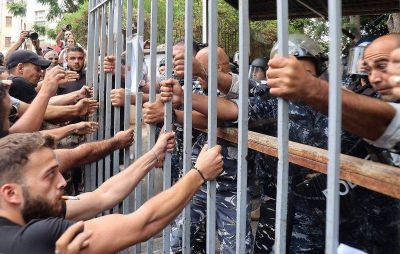
A bank branch closed Wednesday morning in Sin al-Fil, Beirut. (Photo P. H. B.)
Lebanese banks will not reopen tomorrow, as previously stated, but will instead remain closed indefinitely, according to the Association of Banks in Lebanon (ABL).
The closures come in response to a series of hold-ups undertaken last week by aggrieved depositors attempting to access their own funds, which are locked due to the ongoing economic crisis.
In a brief statement issued after a Wednesday meeting, the ABL pointed to the "risks" that continue to plague the sector's employees and customers. It also blamed a prevailing climate of "incitement to violence" and the absence of any concrete measures by authorities to strengthen security around bank branches.
According to a banking source, banks are waiting to see how the situation develops before deciding how to proceed next week.
"There is nothing new about the plan announced last Friday by the Ministry of Interior and Municipalities," said George al-Hajj, president of the Federation of Bank Employees. He added that the banking services maintained during this week's closures will continue in event of prolonged closure.
These services include ATM withdrawals and online banking applications. There are also indications that banks may provide an even wider range of operations outside their branches. For example, before the ABL announced the closure of the branches last week, at least one of the country's banks sent messages to its customers urging them to make an appointment before going to their branch.
In several establishments, employees at the head offices — where the software that manages their client services is usually centralized — were on duty since Monday. If the closure of banks has not yet had an impact on the payment of salaries in the private or public sector, it is because salaries are usually processed around the middle or end of the month.
Grey zone
No less than seven bank branches were held-up by depositors last week. The banks condemned these actions, while depositors' associations and much of public opinion supported them, pointing to the arbitrary restrictions on access to foreign currency accounts that the sector has implemented since the start of the crisis.
Banking restrictions in Lebanon can be compared to those imposed in Cyprus or Greece during the financial crises that these countries recently experienced. The problem in Lebanon is that they are not endorsed by any law, but the Banque du Liban has indirectly validated them through several schemes which have the effect of devaluing the deposits when they are withdrawn or transferred.
This legal grey area jeopardizes depositors' chances of winning their case in court, even though Lebanese law requires banks to return deposits in their original currencies. Additionally, political figures and bank executives are suspected of having transferred their money out of the country while banks were refusing to allow depositors to access their funds.
A new draft law imposing capital controls is considered by experts to be perfectible at best and, at worst, disguised amnesty for banks. The International Monetary Fund, which ended a whirlwind visit to Lebanon Tuesday, has made the restructuring of the banking sector a prerequisite for the release of any financial aid that might be granted to the country.


